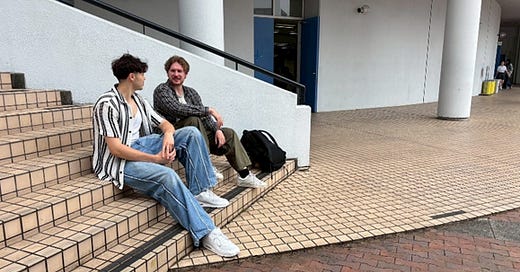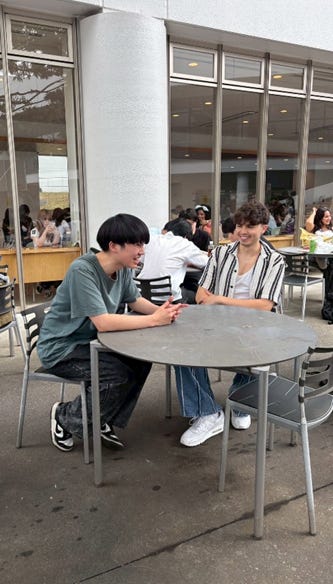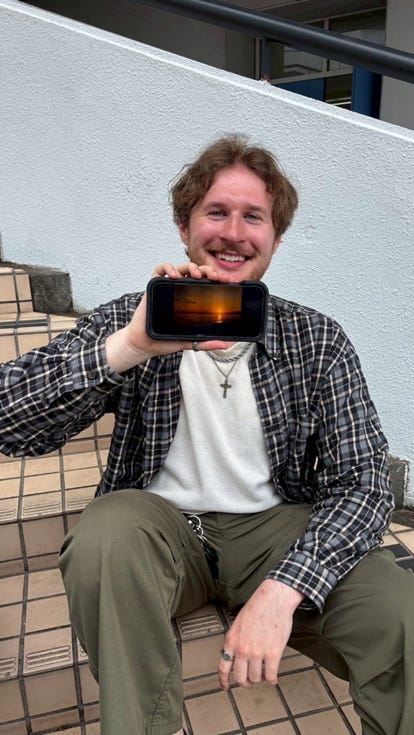International students in Japan
by Marie Tanabe, Rianna Nanjappa, Shutaro Tanaka, Mei Mayuzumi
International students in Japan
Japan has become a popular destination for international students, with around 336,708 studying there as of May 2024, 20.6% increase from the previous year. Most come from China, Nepal, Vietnam, Myanmar, and South Korea, attending universities, training colleges, and language schools.
To attract more students, the government launched initiatives like the 300,000 International Students Plan and the Global 30 Project, which promote English-taught programs and easier pathways to study and stay in Japan.
However, many international students still face challenges beyond academics. According to Nerys Rees’s article, common struggles include language barriers, limited support, and social isolation, leaving many feeling excluded despite participating in English programs.
We interviewed two full time international students on campus to deepen our knowledge on this topic.
Subject 1: Erik Elhamalaway
Born in and brought up in New York city in America. Erik studied two years at the University of Central Florida before transferring to Meiji Gakuin University.
1. Why did you choose to study in Japan as a fill time foreign student? What attracted you the most? Why not as an ISP student?
Originally, I came to Japan as an ISP student for just one semester. At first, I saw it as a temporary experience, an opportunity to study abroad and explore a new culture. However, during my time here, I found that I really connected with the lifestyle in Japan, especially in Tokyo. The environment, both academically and socially, felt like a better fit for me compared to my previous college in Florida. In Tokyo, I feel more inspired and motivated. There’s always something going on such as cultural events, networking opportunities, and access to industries I’m interested in. I also found the academic system here more aligned with my personal learning style. The classes are challenging but meaningful, and the international student community is very supportive. Ultimately, I realized that staying in Japan long-term could offer me not only a richer educational experience but also better career prospects, especially in fields like international business, technology, and media. That’s why I made the decision to transfer and become a full-time student. It wasn’t part of my original plan, but it felt like the right choice for both my personal growth and my future goals.
Have you experienced any cultural differences? What were they?
Honestly, I haven’t experienced any cultural differences that were too shocking or difficult to adjust to. The biggest cultural difference for me has been the level of cleanliness. I’m originally from New York City, and when I compare it to Japan, especially Tokyo, the difference is really noticeable. In most areas of Tokyo, it’s hard to find any trash or litter on the streets, even though there aren’t many public trash cans. People are very mindful about keeping public spaces clean. In contrast, in New York, finding a truly clean street can be a challenge. It’s not uncommon to see litter scattered around, even in nicer areas. The attention to cleanliness and public responsibility in Japan really stood out to me and made a strong impression.
3. What is something you were looking forward to before you came to Japan? Did it meet your expectations?
The main reason I chose to study in Japan was the convenience of travel. The metro system could take me wherever I want to go and if I want to take a weekend or day trip to any part of the country it is extremely accessible. I want to visit not only urban areas but also countryside of Japan. I have been to Kyoto, Okinawa, Gunma, Osaka, Kobe, Sendai, Hiroshima, and Yamagata. Tokyo is still my favorite place and Okinawa is probably #2. The metro system did live up to my expectations and it is probably the best system of any country I have been in thus far.
4. Would you want to work in Japan after graduating from a Japanese university? (Meiji Gakuin University?) If so, why? If not, what aspects discourage you from doing so?
I do want to work in Japan after college but not for a Japanese company. It's because that I love Japanese culture and Japanese atmosphere. Also, I have many places where I want to go. I want to start my own business immediately after receiving my master's degree. Not that I specifically have a problem with Japanese work culture, I would just prefer to be my own boss in any country I end up living in in the future. I have not decided what kind of business I will do so now I major in economics mainly to understand the current situation. Also, I try to improve my Japanese skills.
Subject 2: Aidan Fire
Born in and brought up in Grand Forks, North Dakota, Aidan Fire is currently a fourth year student in Meiji Gakuin University’s department of Global and Transcultural studies.
1. Why did you choose to study in Japan as a full time foreign student? What attracted you the most? Why not as an ISP student?
First, I actually came here as an ISP student. I became interested in coming here full time when the international center reached out to me and offered me the opportunity to transfer here as a third year student. I had grown up in a town of 50,000 people and had never lived anywhere outside of there, so I jumped at the opportunity to move across the world and experience something new.
2. Have you experienced any cultural differences? What were they?
Definitely, but there haven’t been too many. The concept of 本音 (ほんね, one’s true feelings) and 建前 (たてまえ, public stance) don’t really exist in America - we always encourage everyone to communicate their exact feelings and to leave nothing left unsaid. These two concepts as well as 空気を読む (read the room) are things that were new, but weren’t too difficult to adjust to. Also, the fact that everything is so clean and organized despite so many people being around. I’ve been to large cities in the US, and none of them are as safe or clean as anywhere that I’ve been while in Japan.
3. What is something you were looking forward to before you came to Japan? Did it meet your expectations?
I didn’t really have any expectations before I came to Japan - I came over here without knowing much about the country to be honest. I didn’t know any of the language, had never studied the country, nothing. I think that ended up being the best for me, because everything was a surprise and was new.
4. Would you want to work in Japan after graduating from a Japanese university? If so, why? If not, what aspects of Japanese companies discourage you from doing so?
I’d consider it if the opportunity were good enough. I have to consider the fact that because I am not Japanese, I simply will not be given the same opportunities as Japanese people will be when applying to work for a Japanese company. There is a definitive glass ceiling for me, which is unfortunate. I also have to consider the work-life balance culture here. It is somewhat different from the way I that I think about work.
Both Erik Elhamalaway and Aidan Fire began their journeys in Japan as International Student Program (ISP) participants but later made the decision to transfer and become full-time students at Meiji Gakuin University. Their reasons for doing so highlight the profound impact that Japan had on their academic, personal, and professional aspirations. Erik, originally from New York and studying in Florida, found Tokyo to be a city that not only aligned better with his learning style but also offered richer opportunities for growth in fields like international business and media. The city's vibrant energy, cultural events, and efficient infrastructure convinced him to extend his stay and pursue a full degree. Aidan, coming from a small town in North Dakota, viewed the offer to transfer as a rare chance to step out of his comfort zone. Despite having little prior knowledge of Japan, he welcomed the unpredictability and freshness of the experience, which allowed him to embrace everything as new and exciting.
Cultural differences were noted by both students, yet neither found them overwhelmingly difficult to adapt to. Erik was especially struck by Japan’s emphasis on cleanliness and the shared responsibility people feel toward maintaining public spaces—something he found lacking in American cities. Aidan, on the other hand, encountered deeper cultural nuances such as the contrast between one’s true feelings (本音) and public face (建前), and the importance of reading the atmosphere (空気を読む). While these were unfamiliar concepts to him, he acknowledged them as meaningful aspects of Japanese communication and culture.
Expectations prior to arrival also varied. Erik looked forward to the convenience of domestic travel and found the country’s transportation system and range of accessible destinations to be even more impressive than anticipated. He has since travelled extensively within Japan, with Tokyo and Okinawa ranking as his favourite places. In contrast, Aidan arrived in Japan with no concrete expectations. His lack of preparation turned out to be an advantage, as it allowed him to appreciate every aspect of the culture and environment without preconceived notions.
In terms of future plans, Erik expressed a strong desire to remain in Japan, though he hopes to eventually start his own business rather than work within a traditional Japanese company. His major in economics and efforts to improve his Japanese language skills reflect a strategic preparation for this goal. Although Aidan did not elaborate on his post-graduation plans, his motivations and open-minded approach suggest a continuing interest in cross-cultural experiences.
In conclusion, both students’ experiences reflect the transformative potential of studying abroad—not just as a temporary academic exercise, but as a turning point in life. Their stories show that immersion in a different culture can lead to unexpected shifts in perspective, long-term goals, and personal identity. Japan, through its unique blend of order, tradition, and innovation, provided an environment that deeply resonated with both Erik and Aidan, encouraging them to pursue paths they had not initially considered.
References
Rees, N. (2024) ‘Understanding international student experiences in Japanese higher education: belonging as an indicator of internationalisation success’. London Review of Education, 22 (1), 27. DOI: https://doi.org/10.14324/LRE.22.1.27.
Japan Student Services Organization. (2025, April). Result of international student survey in Japan, 2024. https://www.studyinjapan.go.jp/en/statistics/enrollment/data/2504301000.html







